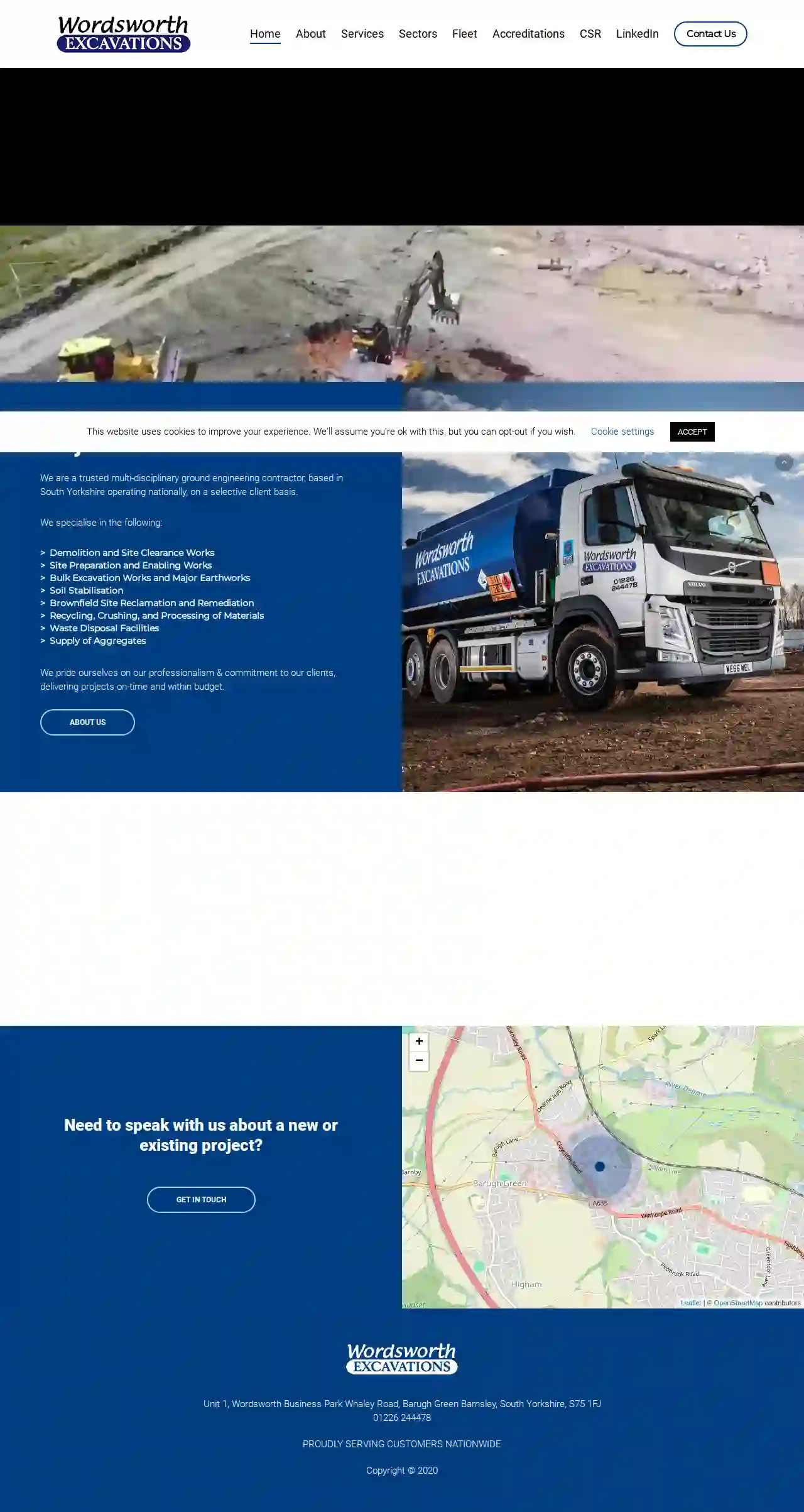Excavation Contractors Hoyland Nether
Best Trenching Services in Hoyland Nether
Receive up to 3 Excavating Contractors quotes for your project today! Compare profiles, reviews, accreditations, portfolio, etc... and choose the best offer.

Kt Excavations Ltd
51 reviewsUnit 71, Albion Road, Carlton Ind Est, Carlton, Barnsley, S71 3HW, GBFrom Ground Up, We're Your Trusted Partner. Professional Excavations & Groundwork Services in Barnsley Welcome to KT Excavations, your dedicated partners in bringing your projects to life. With many years of industry experience, we've honed our craft to deliver unparalleled quality, precision, and reliability. We have a strong team of skilled professionals who will work with you from site preparation to foundation laying, and so much more. Our comprehensive suite of services is tailored to meet the unique needs of each project, ensuring optimal results every step of the way. Whether you're a homeowner embarking on a residential construction project or a commercial developer undertaking a large-scale endeavor, we will deliver exceptional results that stand the test of time.
- Services
- Why Us?
- Testimonials
- Gallery
Get Quote
Braithwaite Excavations & Demolitions Ltd
3.73 reviewsBarnsley, GBThis domain name is parked for FREE by fasthosts.co.uk. Looking to buy a similar domain? Start search. Do more with your domain. Access all the tools you need for online success. Find out more. Need help? Our friendly experts are here 24/7 to answer your domain questions, from registering a similar domain to connecting your domain name to your site. Contact us.
- Services
- Why Us?
- Gallery
Get Quote- G.
G.A.Siddons
4.25 reviewsBarnsley, GB- Services
- Why Us?
Get Quote 
Wordsworth Excavations
3.919 reviewsBarnsley, GB- Services
- Why Us?
Get Quote
Jakto Transport Ltd - Excavations, Demolitions and Groundworks
4.814 reviewsBarnsley, GB- Services
- Why Us?
Get Quote- Ba
Barrett Excavation Ltd
56 reviewsBarnsley, GB- Services
- Why Us?
Get Quote - Og
Ogdens Excavation Ltd
52 reviewsBarnsley, GB- Services
- Why Us?
Get Quote - Ee
Eezi Dig Groundworks & Excavations
51 reviewsBarnsley, GB- Services
- Why Us?
Get Quote
Over 13,059+ Excavation Contractors registered
Our excavation contractors operate in Hoyland Nether and beyond!
ExcavationHQ has curated and vetted Top Excavation Businesses in Hoyland Nether. Find a trustworthy business today.
Frequently Asked Questions About Excavation Contractors
- Determine the Area: Measure the length and width of the area you want to fill. Multiply them to get the area in square feet (or meters).
- Determine the Depth: Measure the difference between the existing grade and the desired grade (how much you need to raise the ground). This is the depth of fill required.
- Calculate Volume: Multiply the area (step 1) by the depth (step 2) to get the volume in cubic feet (or meters).
- Account for Compaction: Fill dirt compacts when it settles, so add 10% to 25% to the calculated volume to account for compaction. The exact percentage depends on the type of fill material.
- Sloped Property: Your property has a significant slope, making it prone to soil erosion or landslides.
- Creating Usable Space: You want to level off a sloped area to create a flat surface for patios, gardens, or other outdoor spaces.
- Preventing Damage: Erosion is threatening existing structures, driveways, or walkways.
- Landscaping Features: You're incorporating tiered gardens, raised beds, or other landscaping elements requiring soil retention.
How do I calculate how much dirt I need for fill?
What is the difference between excavation and grading?
Excavation: Primarily involves removing earth or other materials from a site. It's about digging down and creating space.
Grading: Focuses on shaping and leveling the ground to a specific slope or elevation. It's about adjusting the existing terrain.
For example, you might excavate a foundation and then grade the surrounding area to ensure proper drainage and a level surface for landscaping.
What is the difference between cut and fill excavation?
Cut: Involves excavating soil from an area where the existing grade is higher than the desired grade.
Fill: Refers to using the excavated soil ('cut' material) to raise the grade in an area where the existing grade is lower than desired.
This method minimizes the need to import or export soil, reducing costs and environmental impact. It's commonly used for site preparation, road construction, and landscaping.
How do I know if I need a retaining wall?
How do I calculate how much dirt I need for fill?
- Determine the Area: Measure the length and width of the area you want to fill. Multiply them to get the area in square feet (or meters).
- Determine the Depth: Measure the difference between the existing grade and the desired grade (how much you need to raise the ground). This is the depth of fill required.
- Calculate Volume: Multiply the area (step 1) by the depth (step 2) to get the volume in cubic feet (or meters).
- Account for Compaction: Fill dirt compacts when it settles, so add 10% to 25% to the calculated volume to account for compaction. The exact percentage depends on the type of fill material.
What is the difference between excavation and grading?
Excavation: Primarily involves removing earth or other materials from a site. It's about digging down and creating space.
Grading: Focuses on shaping and leveling the ground to a specific slope or elevation. It's about adjusting the existing terrain.
For example, you might excavate a foundation and then grade the surrounding area to ensure proper drainage and a level surface for landscaping.
What is the difference between cut and fill excavation?
Cut: Involves excavating soil from an area where the existing grade is higher than the desired grade.
Fill: Refers to using the excavated soil ('cut' material) to raise the grade in an area where the existing grade is lower than desired.
This method minimizes the need to import or export soil, reducing costs and environmental impact. It's commonly used for site preparation, road construction, and landscaping.
How do I know if I need a retaining wall?
- Sloped Property: Your property has a significant slope, making it prone to soil erosion or landslides.
- Creating Usable Space: You want to level off a sloped area to create a flat surface for patios, gardens, or other outdoor spaces.
- Preventing Damage: Erosion is threatening existing structures, driveways, or walkways.
- Landscaping Features: You're incorporating tiered gardens, raised beds, or other landscaping elements requiring soil retention.